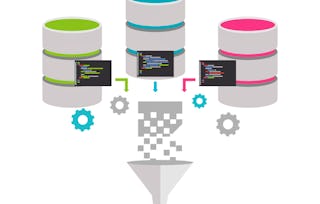This is the second of four courses in the Google Business Intelligence Certificate. In this course, you'll explore data modeling and how databases are designed. Then you’ll learn about extract, transform, load (ETL) processes that extract data from source systems, transform it into formats that enable analysis, and drive business processes and goals.

The Path to Insights: Data Models and Pipelines

The Path to Insights: Data Models and Pipelines
This course is part of Google Business Intelligence Professional Certificate

Instructor: Google Career Certificates
68,674 already enrolled
Included with
709 reviews
What you'll learn
Build data models that answer business questions
Apply the ETL process to workplace scenarios
Explore ETL tools
Construct a pipeline to deliver necessary data
Skills you'll gain
Details to know

Add to your LinkedIn profile
See how employees at top companies are mastering in-demand skills

Build your Data Analysis expertise
- Learn new concepts from industry experts
- Gain a foundational understanding of a subject or tool
- Develop job-relevant skills with hands-on projects
- Earn a shareable career certificate from Google

There are 4 modules in this course
You’ll start this course by exploring data modeling, common schemas, and database elements. You’ll consider how business needs determine the kinds of database systems that BI professionals implement. Then, you’ll discover pipelines and ETL processes, which are tools that move data and ensure that it’s accessible and useful.
What's included
19 videos16 readings9 assignments2 plugins
You’ll learn more about database systems, including data marts, data lakes, data warehouses, and ETL processes. You’ll also investigate the five factors of database performance: workload, throughput, resources, optimization, and contention. Finally, you’ll consider how to design efficient queries that get the most from a system.
What's included
6 videos7 readings3 assignments2 plugins
You’ll learn about optimization techniques including ETL quality testing, data schema validation, business rule verification, and general performance testing. You’ll also explore data integrity and learn how built-in quality checks defend against potential problems. Finally, you’ll focus on verifying business rules and general performance testing to make sure pipelines meet the intended business need.
What's included
10 videos10 readings5 assignments2 plugins
You’ll complete an end-of-course project by creating a pipeline process to deliver data to a target table and developing reports based on project needs. You’ll also ensure that the pipeline is performing correctly and that there are built-in defenses against data quality issues.
What's included
5 videos12 readings3 assignments
Earn a career certificate
Add this credential to your LinkedIn profile, resume, or CV. Share it on social media and in your performance review.
Instructor

Offered by
Explore more from Data Analysis
 Status: Free Trial
Status: Free Trial Status: Free Trial
Status: Free Trial Status: Free Trial
Status: Free Trial Status: Free Trial
Status: Free Trial
Why people choose Coursera for their career

Felipe M.

Jennifer J.

Larry W.

Chaitanya A.
Learner reviews
- 5 stars
81.80%
- 4 stars
11.28%
- 3 stars
3.24%
- 2 stars
2.11%
- 1 star
1.55%
Showing 3 of 709
Reviewed on Jul 20, 2024
well presented and easy to understand for beginners
Reviewed on May 28, 2023
Awesome from the theory point, however lacking when it comes to tools usage.
Reviewed on Apr 12, 2023
Course materials [check], delivery [check], testing knowledge [check]. Thanks, Ed👏

Open new doors with Coursera Plus
Unlimited access to 10,000+ world-class courses, hands-on projects, and job-ready certificate programs - all included in your subscription
Advance your career with an online degree
Earn a degree from world-class universities - 100% online
Join over 3,400 global companies that choose Coursera for Business
Upskill your employees to excel in the digital economy
Frequently asked questions
Organizations of all types and sizes have business processes that generate massive volumes of data. Information is constantly created by computers, the internet, phones, texts, streaming video, photographs, sensors, and more. In the global digital landscape, data is increasingly imprecise, chaotic, and unstructured. As the speed and variety of data increase exponentially, organizations are struggling to keep pace.
Business intelligence is the work involved in gathering, structuring, interpreting, monitoring, and reporting this data in accessible formats that enable stakeholders to understand and use it effectively. Organizations rely on this information to make better strategic and operational business decisions. As a result, there is high demand in the marketplace for business intelligence professionals with the skills and expertise to achieve these goals.
Business intelligence professionals are critical to many organizations today. They use data to help solve business problems, performing a variety of tasks that enable decision makers to understand and use data effectively. Some common responsibilities of BI professionals include gathering project requirements from stakeholders, retrieving and organizing large datasets, and creating visualizations and dashboards to report insights to others. Organizations use the intelligence they share to make decisions, develop new processes, create business strategies, and conduct deeper analyses.
As businesses generate more and more data, there is increased demand for BI professionals to transform this data into meaningful business insights. BI skills are transferable to jobs across multiple industries, including financial services, education, healthcare, and manufacturing. The Google Business Intelligence Certificate will help you prepare for a job in the BI field.
More questions
Financial aid available,
¹ Some assignments in this course are AI-graded. For these assignments, your data will be used in accordance with Coursera's Privacy Notice.

